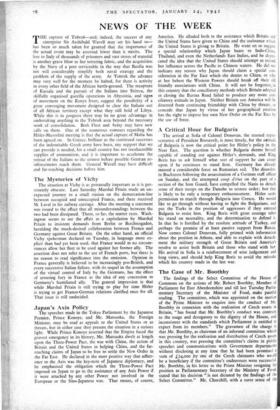Japan's Axis Policy
The speeches made in the Tokyo Parliament by the Japanese Premier, Prince Konoye, and Mr. Matsuoka, the Foreign Minister, may be read as appeals to the United States or as threats, but in either case they present the situation in a serious light. While Prince Konoye asserted that the Empire faced the gravest emergency in its history, Mr. Matsuoka dwelt at length upon the Three-Power Pact, the war with China, the action of Britain and the United States in helping China, and the far- reaching claims of Japan to be free to settle the New Order in the Far East. He declared in the most positive way that adher- ence to the Axis was the key-note of Japanese diplomacy, and he emphasised the obligation which the Three-Power Pact imposed on japan to go to the assistance of any Axis Power if it were attacked by any other Power not involved in the European or the Sino-Japanese war. That means, of course, America. He alluded both to the assistance which Britain and the United States have given to China and the assistance which the United States is giving to Britain. He went on to suggest a special relationship which Japan bears to Indo-China, Thailand, and even the Netherlands East Indies, and he depre- cated the idea that the United States should attempt to extend her influence across the Pacific to Chinese waters. He did not indicate any reason why Japan should claim a special con- sideration in the Far East which she denies to China, or why at her behest the Western Powers should break off their old friendly associations with China. It will not be forgotten, in this country that the conciliatory methods which Britain adopted in closing the Burma Road failed to produce any more con- ciliatory attitude in Japan. Neither Britain nor America will be deterred from continuing friendship with China by threats, or concede that Japan by virtue of her geographical position has thc right to impose her own New Order on the Far East by the use of force.






























 Previous page
Previous page